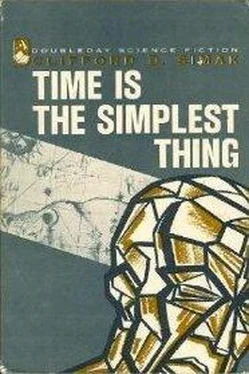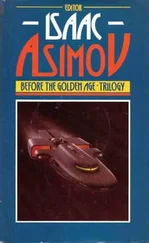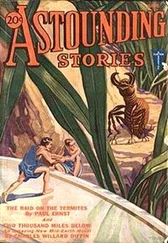“They’re all wrought up,” said Blaine. “Lambert Finn is here.”
“Oh, yes,” Rand said carelessly. “An old friend of ours.”
“Not of mine. I never met the man.”
“A charming soul,” said Rand. “A very charming one.”
Blaine said: “I know very little of him. Just what I have heard.”
Rand grunted.
“I would suggest,” he said, “that you spend the night at the Post. The factor will be able to find some place to bed you down. I wouldn’t be surprised if he could dig up a bottle, too. I suddenly feel the need of a monstrous slug of booze.”
“I could stand one myself,” Blaine told him.
For there was no sense of fighting now, no more sense than running. You went along with them and waited for your chance. They tried to throw you off your balance and you tried to throw them off theirs. And all along you knew, both of you might know, that it was a most polite but very deadly game.
Although he wondered why he bothered. After the last few weeks, he told himself, Fishhook would seem an engaging place. Even if they sent him to the detention resort in Baja California, it would be better than the prospect he faced in this Missouri river town.
They reached the car that sat beside the road, and Blaine waited for Rand to get underneath the wheel, then crawled in himself.
Rand started the engine but did not switch on the lights. He pulled the machine out into the roadway and went drifting down it.
“The police can’t really do much more,” he said, “than run you under cover, but there seems to me no point in getting tangled up with them if you can avoid it.”
“None at all,” said Blaine.
Rand avoided the center of the town, went sneaking down the side streets. Finally he cut back and went sliding up an alley, swung into a parking lot and stopped.
“Here we are,” he said. “Let’s go get that drink.”
The back door opened to his knock and they walked into the back room of the Trading Post. Most of the place, Blaine saw, was used as storage space, but one corner of it served as a living room. There was a bed and stove and table. There was a massive stone fireplace with a wood fire burning in it and comfortable chairs ranged in front of it.
Up near the door that went into the front part of the store stood a massive boxlike structure, and Blaine, although he’d never seen one, recognized it immediately as a transo — the matter transference machine which made the vast network of Trading Posts stretched around the globe an economic possibility. Through that box could come, with a moment’s notice, any of the merchandise for which any of the thousands of retail outlets might find itself in need.
This was the machine that Dalton had talked about that night at Charline’s party — the machine which he had said could wipe out the world’s transportation interests if Fishhook ever chose to put it in public use.
Rand waved a hand at one of the chairs. “Make yourself comfortable,” he said to Blaine. “Grant will rustle up a bottle. You have one, don’t you, Grant?”
The factor grinned. “You know I do. How else could I live in a place like this?”
Blaine sat down in one of the chairs before the fire, and Rand took one facing him. He rubbed his hands together.
“We parted over a bottle,” he reminded Blaine. “I’d say it was only fitting to renew our acquaintance over one.”
Blaine felt a tenseness growing in him, the sense of being trapped, but he grinned at Rand.
“You know the margin that I had that night?” he asked. “Eight lousy little minutes. That was all I had.”
“You miscalculated, Shep. You had exactly twelve. The boys were a little slow in getting out the tape.”
“And Freddy. Who’d ever thought that Freddy worked for you?”
“You’d be surprised,” Rand told him blandly, “at some of the people I have working for me.”
They sat easily before the blazing fire of apple wood, measuring one another.
Finally Rand said: “Why don’t you tell me, Shep? I haven’t all the answers. I can’t get it figured out. You ran into that situation out beyond the Pleiades and you got it buttoned up. . . .”
“Buttoned up?”
“Sure. Buttoned up. Exclusive. We knew that you had something and we sent some others out there and your creature sits and stares at them and that is all it does. They try to talk with it and it’s absolutely dumb. It pretends it doesn’t hear them. It makes out not to understand. . . .”
“Brotherhood,” said Blaine. “We went through the rites. You wouldn’t understand.”
“I think I do,” said Rand. “How alien are you, Shep?”
“Try me out and see.”
Rand shuddered. “No, thanks. You see, I’ve followed up your trail. It began with Freddy and got weirder as it went along.”
“And what do you intend to do about it?”
“Damned if I know,” said Rand.
The factor brought a bottle and two glasses.
“None for yourself?” asked Rand.
Grant shook his head. “I’ve got some stock arranging up front. If you don’t mind . . .”
“Of course not,” Rand told him. “Go on with your work. One thing . . .”
“What, sir?”
“I wonder if Mr. Blaine could spend the night here.”
“Certainly. Although it’s pretty crude.”
“I don’t mind,” said Blaine.”
“I’d offer you my bed, sir, but frankly it’s no bargain. Once you get used to it, you can live with it, but to start out with—”
“I wouldn’t think of taking it.”
“I could get some blankets and you could bed down on the floor. Believe me, it would be better than the bed.”
“Anything,” said Blaine. “I’ll be thankful for anything at all.”
Rand picked up the bottle and uncorked it.
“I’ll bring out the blankets in a little while,” the factor told them.
“Thank you, Grant,” said Rand.
The man left. The door that led into the front part of the store sighed softly shut behind him.
Rand poured out the liquor.
“Actually,” he said, “unless you want to, you don’t have to stay here.”
“No?”
“I’m going back to Fishhook. Through the transo. You could come along.”
Blaine was silent. Rand handed him the drink.
“Well, what do you say?” he asked.
Blaine laughed. “You’re making it too easy.”
“Perhaps I am,” said Rand.
He took a drink and settled back into the chair.
“The alien part I can understand,” he said. “That is an occupational hazard faced by every traveler. But how does the star machine tie up? You were in cahoots with Stone, of course.”
“You know that Stone is dead.”
“No, I haven’t heard that.” But he was unconvincing.
And suddenly, from the quality of Rand’s voice, from some intuition, Blaine knew that Rand did not care that Stone was dead or that Finn might be in town. It was all one with him. Or it might be even more than that. It might be that Rand was quite satisfied to know that Stone was dead, that he might approve in good part with what Finn was doing. For Fishhook’s monopoly rested upon a nonparry world, upon all the millions of people in the world being forced to look to Fishhook for the commerce with the stars. And so Fishhook and Rand, Blaine realized with something of a shock, might even be quite willing to see Finn’s crusade go rolling ahead to its inevitable conclusion.
And if that was true, could it have been Fishhook instead of Finn which had struck the lethal blow at Stone?
He recoiled at the thought, but it clung inside his brain — for the situation was revealing itself as more than just a simple struggle between Finn and Stone.
It might be best, he told himself, to disclaim immediately any connection whatsoever with the star machine. Perhaps he should have made the disclaimer back there at the shed when Rand first had mentioned it. But if he told the truth, if he told Rand now that he had not known of the star machine until just hours ago, he conceivably might lose a bargaining point of uncertain value. And even if he told him, Rand more than likely would refuse to believe him, for he, after all, had helped Riley nurse the truck which had carried it almost all the way from Mexico.
Читать дальше








